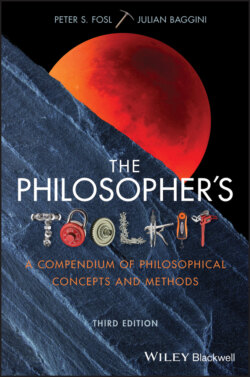Читать книгу The Philosopher's Toolkit - Julian Baggini, Julian Baggini - Страница 30
Assuming the uniformity of nature?
ОглавлениеPut at its simplest, the problem of induction can be boiled down to the problem of justifying our belief in the uniformity of nature or even reality across space and time. If nature is uniform and regular in its behaviour, then what’s been observed past and present (i.e. premises of an induction) is a sure guide to the so far unobserved past, present, and future (i.e. the conclusion of an induction).
The only basis, however, for believing that nature is uniform is the observed past and present. We can’t then, it seems, go beyond observed events without assuming the very thing we need to prove – that is, that unobserved parts of the world operate in the same way as the parts we observe. In short, inductively proving that some bit of the world is like other bits requires already assuming that uniformities of that sort hold.
Induction undertakes to prove the world to be uniform in specific ways; but inductive inference already assumes that the world is relevantly uniform.
We can infer inductively that the sun will rise tomorrow on the basis of what it’s done in the past (i.e. that the future will resemble the past) only if we already assume that the future will resemble the past. Eighteenth‐century Scot David Hume has remained an important philosopher in part precisely for his analysis of this problem.
Believing, therefore, that the sun may possibly not rise tomorrow is, strictly speaking, not illogical, since the conclusion that it must rise tomorrow does not inexorably follow from past observations.
